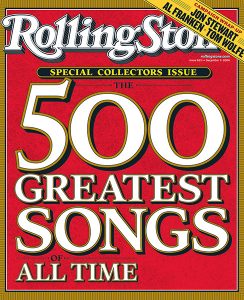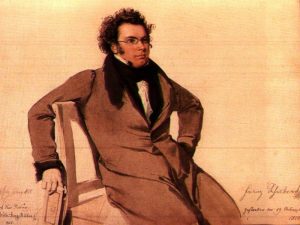
I am taking a one-week hiatus from my celebration of mid-century American orchestral composers because of something I wrote yesterday in Music History Monday for May 6, 2019. That post was about the inception of the song (I Can’t Get No) Satisfaction by Keith Richards.
Here’s the “something” I wrote in yesterday’s post:
“Satisfaction went on to become one of the most important rock ‘n’ roll songs of all time; in 2004, Rolling Stone Magazine went so far as to rate it number two on its list of ‘The 500 Greatest Songs of All Time.’”
Permit me to say that again: in 2004 (and then again in 2010), Rolling Stone Magazine rated Satisfaction number two on its list of “The 500 Greatest Songs of All Time”.
The second greatest song of all time? Really?
How very . . . absurd.

I know Rolling Stone Magazine focuses on popular culture, but still, number two on its list of “The 500 Greatest Songs of All Time”? Given the actual songs on the list, it should have been entitled “The 500 Greatest Songs of the Rock ‘n’ Roll Era.” But no, the good people at Rolling Stonedecided to shoot for the moon and indulge the superlative “greatest” by presumably identifying the most incomparable songs created in history: in their words, “OF ALL TIME.”
So, staying for the nonce with popular culture, did any songs by George Gershwin, Cole Porter, Richard Rodgers, Jerome Kern, Irving Berlin, Harold Arlen, Duke Ellington, Albert von Tilzer (Take Me Out to the Ball Game), Mildred and Patty Hill (Happy Birthday to You), or Samuel Ward and Katharine Bates (America the Beautiful) make the list?
Nope, not a single one.
Being the naïve waif that I am, I might have at least hoped that any list entitled “The 500 Greatest Songs of All Time” might – just might – include a song (or two) by such luminaries as Claude Debussy, Gustav Mahler, Hugo Wolf, Johannes Brahms, Charles Gounod, and Robert Schumann. But no such luck: The Rolling Stone list is made up exclusively of popular songs by the usual, trending, pop culture icons, from Smokey Robinson’s (You Better) Shop Around at number 500 to (ironically, given its title) Bob Dylan’s Like a Rolling Stone at number one.
Most painful of all, though, is the complete omission of the single greatest song writer of all time, someone whose 637 songs stands as far above the rest of us as Mike Trout does above a 4-year-old tee-ball player: Franz Peter Schubert (1797-1828).
Listen: one can have one’s rhubarb rubbed wrong, and then one can have one’s rhubarb rubbed all wrong, and the editors of Rolling Stone Magazine, with their idiotically entitled “500 Greatest Songs of All Time” have RUBBED ALL OF OUR FREAKIN’ RUBARBS ALL FREAKIN’ WRONG.
(Deep. Cleansing. Breaths.)
Schubert cut his musical teeth writing songs; his first masterworks were songs. It was through writing songs that Schubert learned how to convey laser-like literary and expressive meaning with remarkable brevity and intensity. It was through writing songs that Schubert discovered and learned to exploit his amazing gifts as a melodist, harmonist and as a dramatist. Song-like melody infused his music from the beginning of his career to the end, whether that music was written for voice, piano, string quartet or orchestra.
In honor of Schubert’s songs, we turn to his in-every-way-awesome String Quartet in D Minor of 1824, subtitled “Death of the Maiden”, a string quartet that features music composed for the song Death and the Maiden in 1817 when Schubert was 20 years-old. ……
See the story, and the prescribed recording, only on Patreon!
(And a pox on you, Rolling Stones Magazine!)

